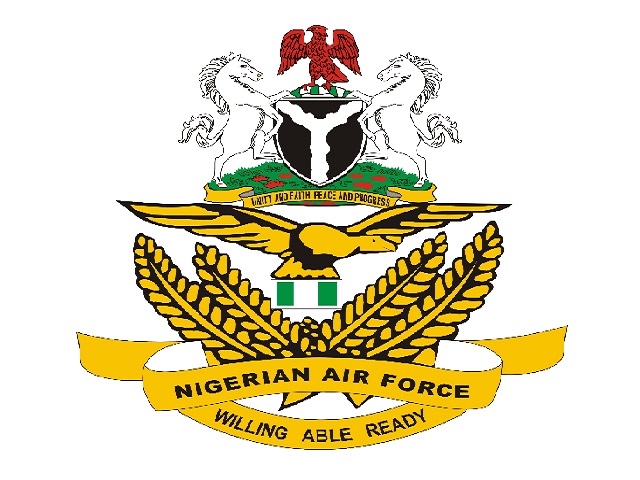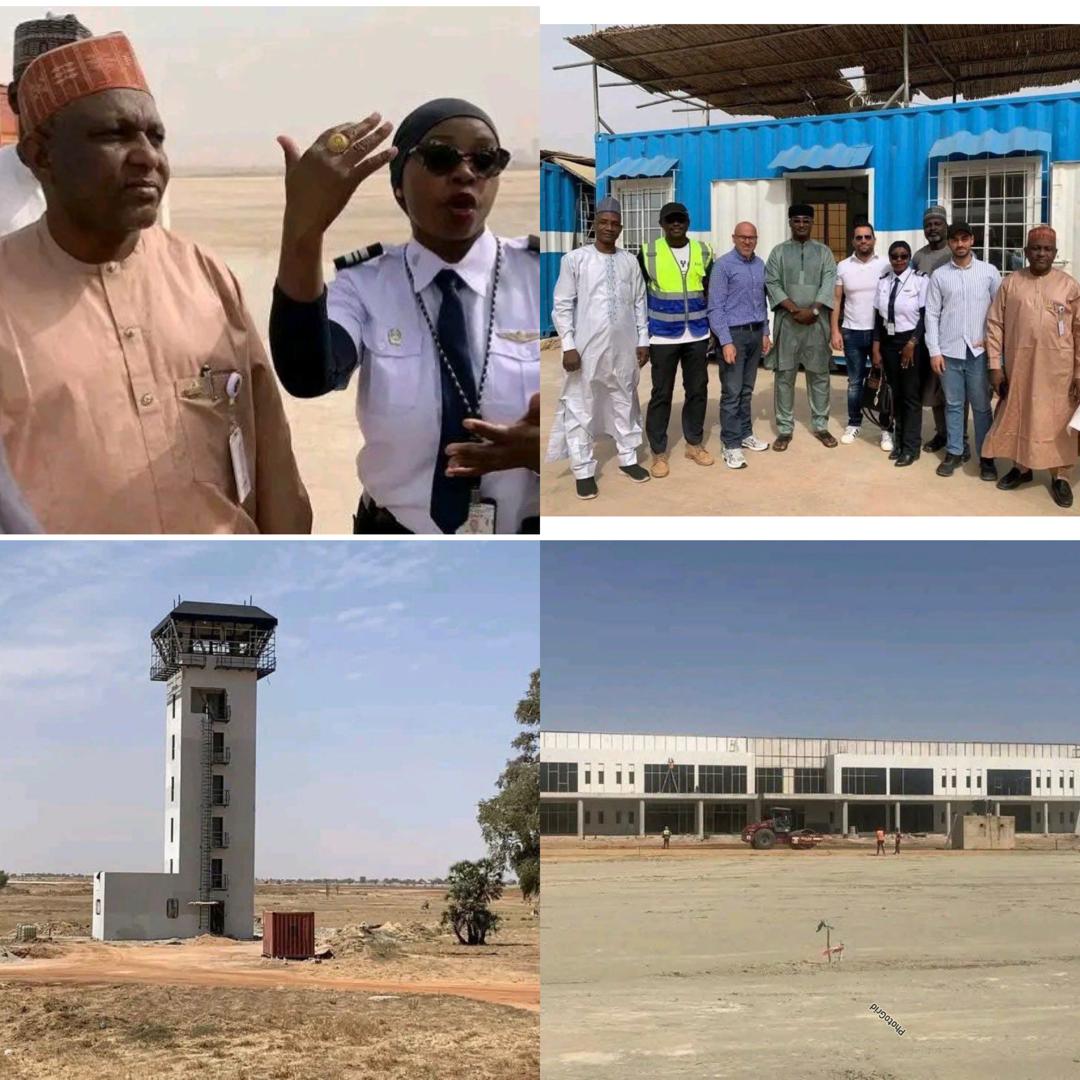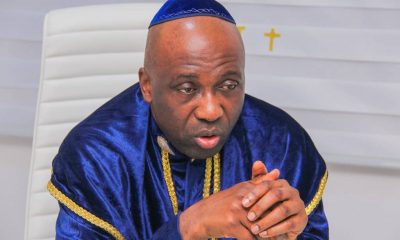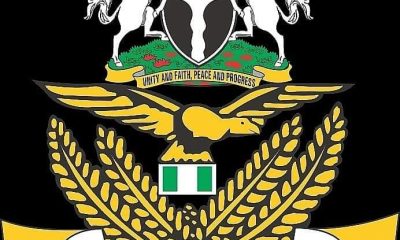society
NAF REVIEWS TRAINING CURRICULA TO MEET EMERGING SECURITY CHALLANGES

NAF REVIEWS TRAINING CURRICULA TO MEET EMERGING SECURITY CHALLANGES
The Chief of Air Staff (CAS), Air Marshal Oladayo Amao, has stated that for personnel of the Nigerian Air Force (NAF) to be combat ready and operate at optimum level to counter both domestic and foreign threats, the need to review the curriculum of its training institutions and facilities has become expedient.
The CAS stated this at the winging ceremony of some pilots and operators held recently at Headquarters NAF, Abuja. According to Air Marshal Amao, the NAF recently reviewed the curricula of the various schools in the Air Force Institute of Technology (AFIT) to meet expected standards, whilst also conducting instructional training for the instructors to ensure enhanced performance. He also revealed that the training curriculum for NAF cadets at the Nigerian Defence Academy has been reviewed and new criteria specified for NAF officers to be eligible for posting to the Academy as instructors.
Also affected are some selected ground and flying schools where the CAS disclosed that, ‘I have authorized the audit of selected institutions in the NAF, including flying schools, by a team of experienced retired senior officers with a view to upgrading the practices and facilities at the institutions to meet international standards and best practices.’
He went further to state that special arrangements have also been made to upgrade operations training facilities to enhance the operational capacity of NAF operators in anticipation of increased tempo of air operations with the recently acquired platforms, while sustaining capacity building programmes for the NAF Regiment in joint efforts for synergy of air-ground integrated operations with sister Services.
Overall, these efforts, according to the CAS, are geared towards positioning the institutions and facilities as centres of excellence that would produce pilots, engineers, technicians and other specialists that are well equipped to carry out their constitutional roles more effectively and efficiently.
Edward Gabkwet
Air Commodore
Director of Public Relations and Information
Nigerian Air Force
11 January 2022
society
NCAT Delegation Tours Gusau International Airport, Commends Governor Lawal, Eyes Strategic Partnership for Aviation Training

NCAT Delegation Tours Gusau International Airport, Commends Governor Lawal, Eyes Strategic Partnership for Aviation Training
In a move signaling a major push for inter-agency cooperation within Nigeria’s aviation sector, a high-level delegation from the Nigerian College of Aviation Technology (NCAT), Zaria, has undertaken an official working visit to Gusau International Airport currently under construction by the administration of Governor Dauda Lawal. The visit, aimed at a comprehensive assessment of the facility’s infrastructure and operational capabilities, is seen as a foundational step toward forging a strategic partnership to bolster aviation training and safety standards across the region.
The NCAT team, led by Nasir Muhammad Bungura, conducted an extensive tour of the airport premises. They were received and accompanied by the Permanent Secretary of the Zamfara State Ministry of Works and Infrastructure, Engr. Haruna Dikko Gusau, underscoring the state government’s keen interest in maximizing the airport’s potential.
During the meticulous inspection, the delegation evaluated the airport’s runway, terminal buildings, navigational aids, and safety apparatus. Following the tour, Mr. Bungura commended Governor Lawal for a job well done as he expressed profound satisfaction with the state of the facility, describing the infrastructure, operational protocols, and visible ongoing upgrade projects as both encouraging and highly promising.
“The standards we have observed here today are commendable and align strongly with international best practices,” Bungura stated. “Gusau International Airport possesses a robust foundation. Our visit was to assess how this facility can serve as a practical hub for our training programs, offering our students real-world exposure to a modern, functioning airport environment.”
The delegation highlighted the airport’s latent potential to serve as a critical node for specialized aviation training, particularly in areas of safety operations, air traffic control simulations, and aircraft handling. Such collaboration, they noted, would not only enhance the practical skills of NCAT cadets but also contribute to elevating the overall safety and efficiency metrics of Nigeria’s air transport system.
Engr. Haruna Dikko Gusau welcomed the NCAT delegation’s interest, reiterating the Zamfara State government under Governor Dauda Lawal is committed to developing the airport as a catalyst for economic growth and regional integration. “This visit is a testament to the growing strategic importance of Gusau International Airport,” Engr. Gusau remarked. “We are not just building infrastructure; we are creating a hub for opportunity. Partnering with a prestigious institution like NCAT will ensure this facility contributes meaningfully to human capital development and the advancement of Nigeria’s aviation industry.”
The visit marks a significant milestone for Gusau International Airport, transitioning its role from a regional transit point to a potential center of excellence for aviation education and a key partner in national aviation development. Both parties are expected to hold further discussions to formalize areas of collaboration, which could pave the way for NCAT to utilize the airport for specialized training exercises and curriculum development in the near future.
society
Ramadan: Adron Homes Felicitates Muslims, Preaches Hope and Unity

Ramadan: Adron Homes Felicitates Muslims, Preaches Hope and Unity
Adron Homes & Properties Limited has congratulated Muslim faithful on the commencement of the holy month of Ramadan, urging Nigerians to embrace the virtues of sacrifice, discipline, and compassion that define the season.
In a statement made available to journalists, the company described Ramadan as a period of deep reflection, spiritual renewal, and strengthened devotion to faith and humanity.
According to the management, the holy month represents values that align with the organisation’s commitment to integrity, resilience, and community development.
“Ramadan is a time that teaches patience, generosity, and selflessness. As our Muslim customers and partners begin the fast, we pray that their sacrifices are accepted and that the season brings peace, joy, and renewed hope to their homes and the nation at large,” the statement read.
The firm reaffirmed its dedication to providing affordable and accessible housing solutions to Nigerians, noting that building homes goes beyond structures to creating environments where families can thrive.
Adron Homes further urged citizens to use the period to pray for national unity, economic stability, and sustainable growth.
It wished all Muslim faithful a spiritually fulfilling Ramadan.
Ramadan Mubarak.
society
Underfunding National Security: Envelope Budgeting Fails Nigeria’s Defence By George Omagbemi Sylvester

Underfunding National Security: Envelope Budgeting Fails Nigeria’s Defence
By George Omagbemi Sylvester | Published by saharaweeklyng.com
“Fiscal Rigidity in a Time of Crisis: Lawmakers Say Fixed Budget Ceilings Are Crippling Nigeria’s Fight Against Insurgency, Banditry, and Organized Crime.”
Nigeria’s legislature has issued a stark warning: the envelope budgeting system; a fiscal model that caps spending for ministries, departments, and agencies (MDAs) is inadequate to meet the country’s escalating security challenges. Lawmakers and budget analysts argue that rigid fiscal ceilings are undermining the nation’s ability to confront insurgency, banditry, kidnapping, separatist violence, oil theft and maritime insecurity.
The warning emerged during the 2026 budget defence session for the Office of the National Security Adviser (ONSA) at the National Assembly in Abuja. Senator Yahaya Abdullahi (APC‑Kebbi North), chairman of the Senate Committee on National Security and Intelligence, decried the envelope system, noting that security agencies “have been subject to the vagaries of the envelope system rather than to genuine needs and requirements.” The committee highlighted non-release or partial release of capital funds from previous budgets, which has hindered procurement, intelligence and operational capacity.
Nigeria faces a multi‑front security crisis: persistent insurgency in the North‑East, banditry and kidnappings across the North‑West and North‑Central, separatist tensions in the South‑East, and piracy affecting Niger Delta oil production. Despite declarations of a national security emergency by President Bola Tinubu, lawmakers point to a “disconnect” between rhetoric and the actual fiscal support for agencies tasked with enforcement.
Experts warn that security operations demand flexibility and rapid resource allocation. Dr. Amina Bello, a public finance specialist, said: “A static budget in a dynamic threat environment is like sending firefighters with water jugs to a forest fire. You need flexibility, not fixed ceilings, to adapt to unforeseen developments.”
The Permanent Secretary of Special Services at ONSA, Mohammed Sanusi, detailed operational consequences: irregular overhead releases, unfulfilled capital appropriations, and constrained foreign service funds. These fiscal constraints have weakened intelligence and covert units, hampering surveillance, cyber‑security, counter‑terrorism and intelligence sharing.
Delayed capital releases have stalled critical projects, including infrastructure upgrades and surveillance systems. Professor Kolawole Adeyemi, a governance expert, emphasized that “budgeting for security must allow for rapid reallocation in response to threats that move faster than political cycles. Envelope budgeting lacks this essential flexibility.”
While the National Assembly advocates fiscal discipline, lawmakers stress that security funding requires strategic responsiveness. Speaker Abbas Ibrahim underscored that security deserves “prominent and sustained attention” in the 2026 budget, balancing oversight with operational needs.
In response, the Senate committee plans to pursue reforms, including collaboration with the executive to restructure funding, explore supplementary budgets and ensure predictable and sufficient resources for security agencies. Experts warn that without reform, criminal networks will exploit these gaps, eroding public trust.
As one policy analyst summarized: “A nation declares a security emergency; but if its budget does not follow with real resources and oversight, the emergency remains rhetorical.” Nigeria’s debate over envelope budgeting is more than an accounting dispute; it is a contest over the nation’s security priorities and its commitment to safeguarding citizens.
-

 celebrity radar - gossips6 months ago
celebrity radar - gossips6 months agoWhy Babangida’s Hilltop Home Became Nigeria’s Political “Mecca”
-

 society6 months ago
society6 months agoPower is a Loan, Not a Possession: The Sacred Duty of Planting People
-

 society5 months ago
society5 months agoReligion: Africa’s Oldest Weapon of Enslavement and the Forgotten Truth
-

 news6 months ago
news6 months agoTHE APPOINTMENT OF WASIU AYINDE BY THE FEDERAL GOVERNMENT AS AN AMBASSADOR SOUNDS EMBARRASSING








